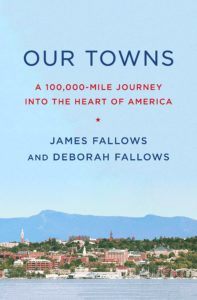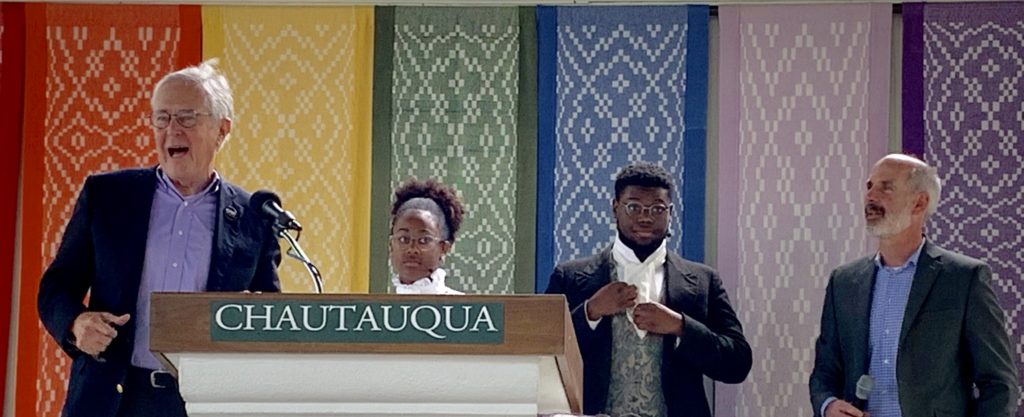CHQ for Mind, Body & Spirit

The Fourth of July 2019 was spectacular! A profound lecture by Risa Goluboff in the morning and a wonderful concert by the Chautauqua Symphony in the evening. During the day we had the joy of being with Peg and Jack and three generations of Jack’s extended family.
The 135-year-old Chautauqua Institution (affectionately abbreviated to CHQ) is on a large, beautiful lake in western New York. Each year since 2012, thanks to the generosity and hospitality of Jack Connolly and Peg Barrett, we have found refreshment there for our minds, our bodies, and our spirits–lectures, plays and classes for our minds; healthy food and plenty of exercise for our bodies; and inspiring sermons, concerts, ballets, operas, and recitals for our spirits. Besides the profound lecture and the exquisite ballet I wrote about earlier, here are three more experiences I want to remember from CHQ, Week Two, 2019.
A play about religion Sunday, June 30
While Steve and Jack played golf, old friends Jan and Michael Yauch, who live in Dewittville and volunteer at Hurlbut Church, persuaded me to go with them to see The Christians. At first, I demurred; Steve and I had already attended the morning service and heard a great sermon by Reverend Zina Jacque. I’m glad I went; three weeks later, I’m still pondering it.
The play, by Lucas Hnath, tackles tough questions. At first we thought we were in a church. A large cross hung above the stage in Bratton Theater, with a choir loft and chairs for clergy in place across the front. After a well-sung hymn by the Chautauqua Motet, guest artist Jamison Jones, playing a pastor of a mega-church, embarks on a long sermon.
The sermon begins with a true story about a man in an African country who gave his life to save his sister in a fire. But, he reports with astonishment, the missionary of his church, who witnessed this heroic self-sacrifice, insists that the man, because he was unbaptized, will burn in Hell. “Too bad he wasn’t converted,” declared the representative of the pastor’s denomination.
The injustice of that position bothers him so deeply that the pastor announces that he no longer believes in Hell. The congregation, including the Assistant Pastor, is shaken to its core. A schism soon results; even his wife walks out. I found myself on the pastor’s side, challenging the foundational beliefs of such “Christians,” just as I daily wonder how professed Christians can support politicians who controvert Jesus’s teachings. Perhaps my creed (see About Martha) needs another revision.
The Christians won the Outer Critics Circle Award for Outstanding New Off-Broadway Play in 2016. Hnath also won an Obie Award for Playwriting for The Christians. Chautauqua Theater Artistic Director Andrew Borba believes the Chautauqua community is the perfect place to stage the play, since Chautauqua is committed to lifelong learning and fostering thoughtful conversation, and also a place that is deeply tied to religious understanding and exploration.
¡Figaro! (90210) – updated Mozart opera set in Beverly Hills
Later that evening, Steve and I attended the Chautauqua Opera Company’s presentation of Vid Guerrerio’s ¡Figaro! (90210), a modern take on Mozart’s The Marriage of Figaro. The original, four-hour opera tells the story of a “single day of madness” following main characters Figaro and his bride-to-be Susanna, who are both employed as servants by Count Almaviva. It takes place three years after Figaro helped the Count marry his wife, Countess Rosine, in the story of The Barber of Seville.
¡Figaro! (90210) shortens the story to two-and-a-half hours. The count and his wife are Hollywood elites living a luxurious lifestyle as Paul and Roxanne Conti. (Remember the zip code for Beverly Hills?) Figaro and his fiancé, Susana, are undocumented Mexican immigrants who work on Paul and Roxanne’s estate. Susana is pressured to sleep with Paul Conti in order to get her Green Card and avoid deportation. Meanwhile, Figaro owes money to a Korean businesswoman who paid for Susana to cross the border. This review in The Chautauquan Daily delves into the contemporary issues the opera addresses.
Steve said he felt lost, because he was unfamiliar with the original story of Figaro. I was more inclined to give it a chance, although it was not a well-polished performance. Guerrerio definitely put the characters into the 21st century; their “sexting” was moderately amusing.
This opera made me curious to learn more about Figaro, the key character in two operas: Mozart’s The Marriage of Figaro and Rossini”s The Barber of Seville. Luckily, the Metropolitan Opera scheduled an encore presentation of their live–in-HD performance of Rossini’s The Barber of Seville on July 10 and I got to see what a captivating character Figaro can be. Both operas are based on plays by Pierre Beaumarchais. According to this article in The Guardian, his plays helped inspire the French Revolution.
Interfaith Lecture: Chuck Yarborough and Student Performers
 On Monday James and Deborah Fallows, co-authors of this intriguing book, introduced the Week Two Interfaith theme, Common Good Change Agents.” Having read most of the book, I was excited to hear them speak. They have spent the last six years flying in their private plane to small cities across the United States. Their journey was inspired by similar travels they had previously made in China.
On Monday James and Deborah Fallows, co-authors of this intriguing book, introduced the Week Two Interfaith theme, Common Good Change Agents.” Having read most of the book, I was excited to hear them speak. They have spent the last six years flying in their private plane to small cities across the United States. Their journey was inspired by similar travels they had previously made in China.
On Wednesday, Fallows presented a great example of a change agent they had discovered in Columbus, Mississippi. The Mississippi School for Mathematics and Science is a small, publicly-supported boarding school that attracts gifted juniors and seniors from all parts of the state. Read their amazing statistics here. MSMS history teacher Chuck Yarborough, who was named Teacher of the Year in April by the Organization of American Historians, brought two recent graduates to join him in a lecture entitled “Burial Ground is Common Ground.”

The three demonstrated how the curriculum connected them with the history and community of Columbus. First, they visited the local cemetery and selected the name of someone buried there who looked interesting. Next they consulted the local archives. To find out more, they searched the internet. After conducting primary research from August to November, the students created a script and acted out scenes from that person’s life. By spring, they were ready to offer a presentation of “Tales from the Crypt” to the community in the same cemetery where their research had begun. For more details see this excellent review in The Chautauquan Daily.
Erin Williams, in historic garb, portrayed Susan Casement Maer, “editress” of the Columbus Commercial, a local newspaper. Dairian Bowles, also dressed in a late 19th century costume, performed his skit on Senator Robert Gleed, the only African American to represent all of Lowndes County in the state legislature.
At the age of 17, I was living in the grips of slavery in Virginia. I escaped, but was captured outside Columbus. Once I was freed (by the Emancipation Act), I immediately set to work starting my own businesses and helping throughout my community. In 1867, the military governor appointed me to the Columbus city council. In 1870, I was elected to the Mississippi State Senate.
Later, Gleed fled to Galveston from Mississippi’s Jim Crow laws. The businesses he created and the property he owned was all confiscated. Bowles, though, 18, is heading to a California College to study filmmaking.
CHQ 2019 included much more–art tours, music recitals, ukulele lessons, shape-note singing at the Baptist House, water aerobics with Peg, encounters with could-be friends at Hurlbut Church lunches. Hope to go back next year.
Leave a Reply